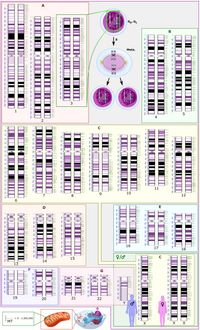
Photo from wikipedia
Meiotic defects cause abnormal chromosome segregation leading to aneuploidy in mammalian oocytes. Chromosome segregation is particularly error‐prone in human oocytes, but the mechanisms behind such errors remain unclear. To explain… Click to show full abstract
Meiotic defects cause abnormal chromosome segregation leading to aneuploidy in mammalian oocytes. Chromosome segregation is particularly error‐prone in human oocytes, but the mechanisms behind such errors remain unclear. To explain the frequent chromosome segregation errors, recent investigations have identified multiple meiotic defects and explained how these defects occur in female meiosis. In particular, we review the causes of cohesin exhaustion, leaky spindle assembly checkpoint (SAC), inherently unstable meiotic spindle, fragmented kinetochores or centromeres, abnormal aurora kinases (AURK), and clinical genetic variants in human oocytes. We mainly focus on meiotic defects in human oocytes, but also refer to the potential defects of female meiosis in mouse models.
Journal Title: BioEssays
Year Published: 2022
Link to full text (if available)
Share on Social Media: Sign Up to like & get
recommendations!